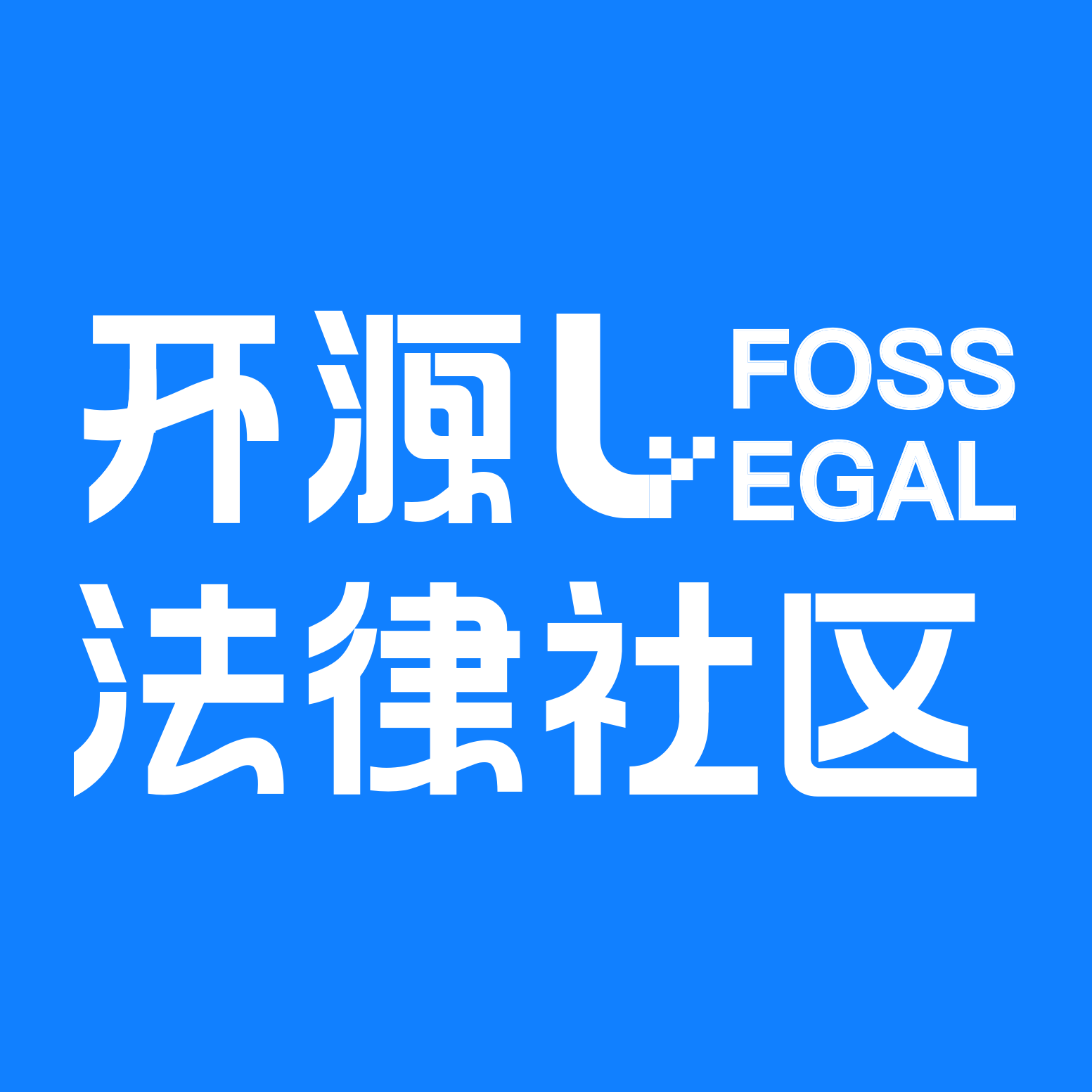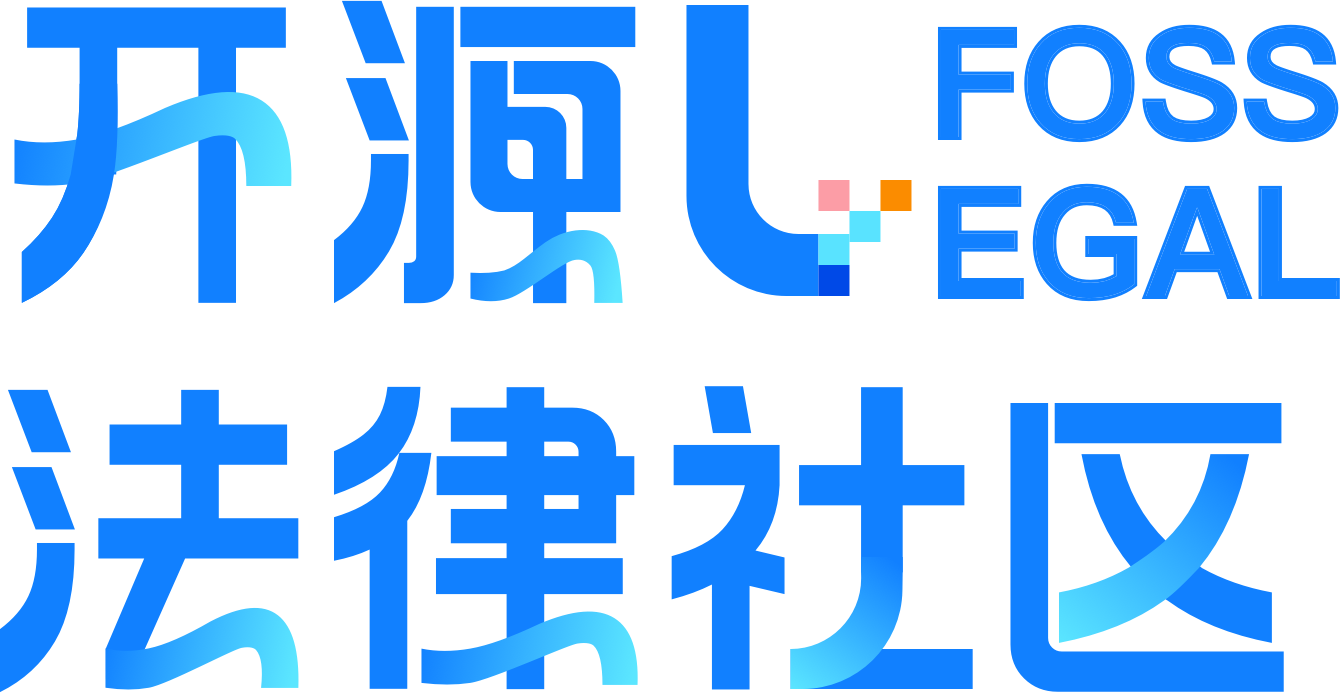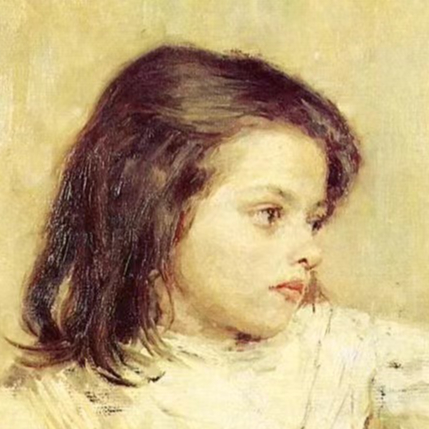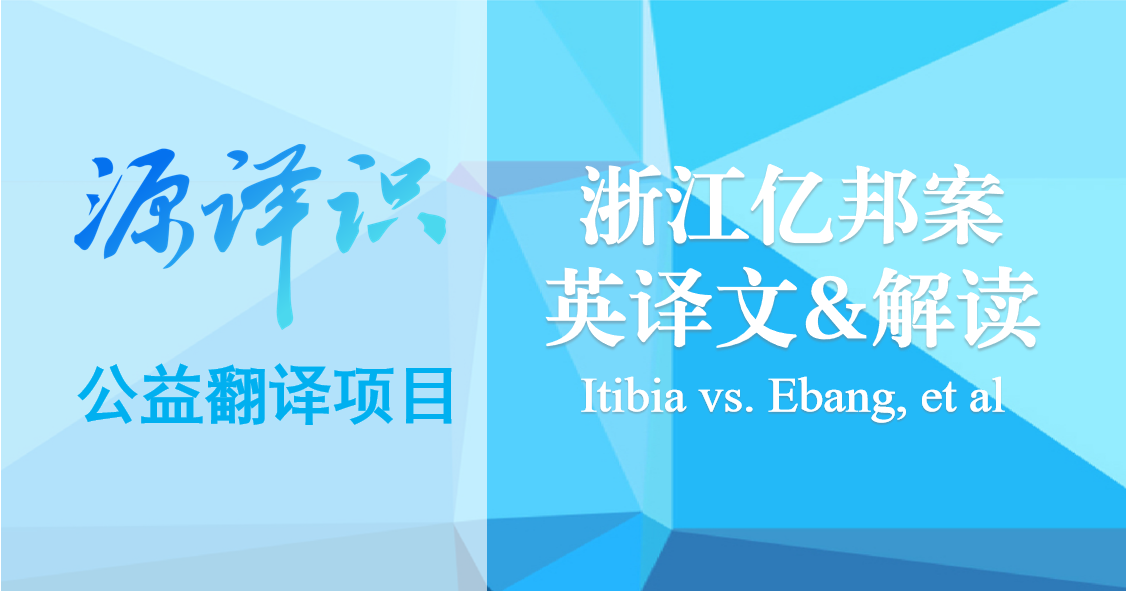
9·30国际翻译日 · 浙江亿邦案判决翻译和案件解读
导语:2024年“9·30 国际翻译日”如期而至,这是译者的专属节日。受版权法启发,本年度节日主题为:“Translation, an art worth protecting", 强调翻译值得按照《伯尔尼公约》受到尊重与受法律保护。
开放原子开源基金会的“源译识”开源公益翻译项目以“在共译中凝聚开源共识”为宗旨,对开源相关许可证、域内外司法判决、专业书籍、重点报告等内容进行专业可信的翻译。我们也诚邀广大开源开发者、开源爱好者及翻译爱好者踊跃参与到“源译识”项目中,一起共建可信的多语种开源资料库,促进开源法律全球化交流,为开源社区的稳健发展与国际接轨做出贡献!欢迎您通过translation@openatom.io与我们联系!
值此国际翻译日到来之际,特此分享“源译识”项目出品的2023年中国最高人民法院涉及GPLv2的判决译文(由郭雪雯、薛杨洁翻译,特邀邓雨亭博士审校)及对本判决的介绍与专业评述(特邀来自中国的陶冶律师、周丹丹律师,以及来自德国的Till Jaeger律师)。最高法在本案中认为涉GPL开源协议争议的软件权利人即使未开源,亦有权针对侵权行为维权,此审判思路与2021年德国卡尔斯鲁厄高级地区法院审判的另一案件类似。
01.判决翻译(节选)
本案判决翻译全文请见:标签 · decisions-translation · AtomGit
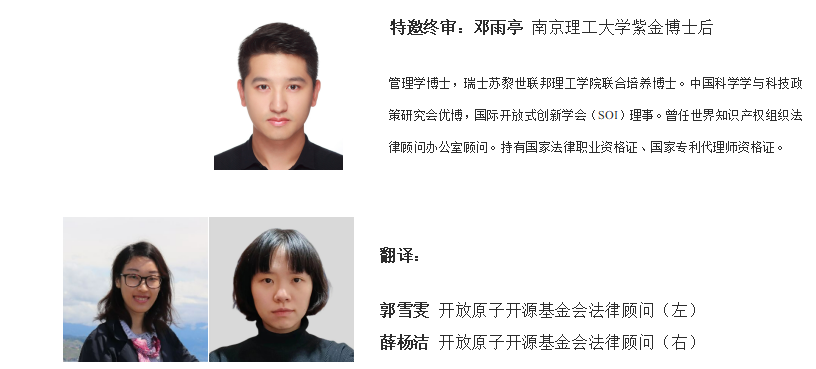
Itibia vs. Ebang, et al
First Instance: 2020-7-14, the Jiangsu Suzhou Intermediate People’s Court
Second Instance: 2023-10-12, the Supreme People’s Court (SPC)
(三)亿邦公司与启奥公司基于GPLv2协议提出的不侵权抗辩是否成立
Whether the non-infringement defense raised by Ebang Company and Itibia Company based on the GPLv2 is established.
亿邦公司与启奥公司上诉认为,在案证据足以证明涉案软件受GPLv2协议约束,根据GPLv2协议约定网经公司本就负有公开涉案软件源代码的开源义务,因此,亿邦公司与启奥公司即便使用了涉案软件源代码,该使用行为亦不构成侵权。对此,本院认为,亿邦公司与启奥公司基于GPLv2协议提出的不侵权抗辩不能成立,理由如下:
Ebang Company and Itibia Company appealed and claimed that the evidence in the case was sufficient to prove that the Software at issue was subject to the GPLv2 agreement, and that according to the GPLv2 agreement, Wangjing Company was obliged to open source and disclose the source code of the Software at issue, and therefore, even if Ebang Company and Itibia Company used the source code of the Software at issue, such use did not constitute an act of infringement. In this regard, the Court holds that the defense of non-infringement raised by Ebang Company and Itibia Company based on the GPLv2 agreement could not be established for the following reasons:
首先,本案系针对涉案软件的著作权侵权纠纷,而非合同纠纷。尽管涉案软件涉及GPLv2协议这一许可合同,但在OpenWRT系统软件权利人并非本案当事人情形下,基于合同相对性原则,本案不宜对涉案软件是否全部或部分受GPLv2协议约束、网经公司是否违反GPLv2协议、以及网经公司是否因此需承担任何违约或侵权责任等问题进行审理。其次,关于涉案软件是否受GPLv2协议约束,该问题涉及底层系统软件是否受GPLv2协议约束、上层功能软件是否构成GPLv2协议项下“独立且分离的程序”、二者间采用的隔离技术手段、通信方式、通信内容等如何界定以及软件领域对GPLv2协议传导性的通常理解与行业惯例等因素。在OpenWRT系统软件权利人并非本案当事人情形下,亦难以查明与GPLv2协议有关的前述系列事实。再者,亿邦公司与启奥公司并无证据证明网经公司通过GPLv2协议已放弃其就涉案软件依据我国著作权法享有的著作权。退而言之,即便假定网经公司因违反GPLv2协议导致涉案软件存在权利瑕疵,该假定瑕疵亦不影响网经公司在本案中针对被诉行为寻求侵权救济。
Firstly, present case is a copyright infringement dispute over the Software at issue, not a contractual dispute. Although the Software at issue is subject to a license agreement, i.e. the GPLv2 agreement, based on the principle of the privity of contract, it is not appropriate to determine all in present case whether the Software at issue is wholly or partially subject to the GPLv2 agreement, whether Wangjing Company violates the GPLv2 agreement and whether Wangjing Company shall bear any liability for breach of contract or infringement, while the right holder of the OpenWRT system software is not a party to this case. Secondly, while the right holder of the OpenWRT system software is not a party to this case, it is also difficult to find out the facts related to the GPLv2 agreement as follows: whether the Software at issue is subject to the GPLv2 Agreement, this issue involves the following considerations: whether the underlying system software is subject to the GPLv2 agreement, whether the upper layer functional software constitutes an “independent and separate program” under the GPLv2 agreement, and how to define the technical measures of isolation, the mechanism of communication and the semantics of communication between the two software, and common understanding and common practices about the copyleft effects of the GPLv2 agreement. In addition, Ebang Company and Itibia Company have no evidence to prove that Wangjing Company has renounced its copyright under Copyright Law of People’s Republic of China on the Software at issue through the GPLv2 agreement. Assuming Wangjing Company did violate GPLv2 agreement and its right to the Software at issue was flawed thereof, such flaw in right shall not affect its right to seek remedies in present case against defendants’ infringement.
综上而论,在软件尚未被开源、该软件著作权人认为其软件不受GPLv2协议约束、被诉侵权人则依据GPLv2协议提出不侵权抗辩的侵权纠纷中,软件开发者自身是否违反GPLv2协议和是否享有软件著作权,是相对独立的两个法律问题,二者不宜混为一谈,以免不合理地剥夺或限制软件开发者基于其独创性贡献依法享有的著作权。但需指出,本案最终认定被诉行为构成侵权并支持网经公司部分诉请,并不表明网经公司将来在潜在的违约和/或侵权之诉中可免予承担其依法应当承担的违约和/或侵权责任。
For the reasons stated above, in an infringement dispute where the software has not yet been open-sourced, the copyright owner of the software believes that the software is not subject to the GPLv2 agreement, and the accused infringer raises the non-infringement defense based on the GPLv2 agreement, the question of whether the software developer per se has violated the GPLv2 agreement and the question of whether he or she enjoys the software copyright are relatively independent legal issues, and it is inappropriate to confuse the two issues, so as not to unreasonably deprive or restrict the software developer’s rights based on his or her original contributions in accordance with the law. However, it should be noted that the final ruling in present case, which finds the accused acts to constitute infringement and upholds part of Wangjing Company’s claims, does not exempt Wangjing Company from his liability in potential lawsuits of either breach of contract or infringement in the future.
请您注意,这不是审理法院的指定翻译,译校者也不为此提供任何担保。
02. 案件评述
Dr. Till Jaeger | JBB Rechtsanwälte律所 合伙人律师
全文请见:https://www.ifross.org/?q=node/1676
节选如下:
The Higher Regional Court of Karlsruhe (Judgment of November 13, 2020, Ref. 6 U 60/20) came to a similar conclusion in the Wordpress Theme case, in which the GPL-2.0 was also asserted in defense. Here, too, a distinction is made depending on whether the owner of an (alleged) derivative work copyright has licensed the derivative work under the GPL-2.0. The mere possibility of a violation of the copyleft is not enough to defend against copyright claims. The enforcement of the GPL-2.0 is the responsibility of the licensors and cannot be enforced by users declaring the software to be “GPL-licensed”. The copyleft effect does not automatically result in GPL licensing; instead, this must be actively undertaken by the author of a derivative work.
(德国)卡尔斯鲁厄高等地区法院在被告同样主张将GPL-2.0作为抗辩理由的Wordpress主题案(2020年11月13日判决,Ref. 6 U 60/20)中也得出了类似结论。在该案中,同样要区分(涉案的)衍生作品版权人是否根据GPL-2.0许可了该衍生作品。(被告)仅凭(原告)存在违反著佐权(Copyleft)的可能性并不足以抗辩(其)版权主张。GPL-2.0维权应当由(基于GPL2.0许可其软件的上游)许可人实施,而不能由(使用衍生软件的下游)用户直接宣称该(衍生)软件“基于GPL许可”。著佐权(Copyleft)效应不会自动导致(衍生作品)基于GPL许可;相反,衍生作品基于GPL许可必须由该衍生作品的作者主动承担。
周丹丹 | 集佳律师事务所合伙人律师
本案最大的争议在于原告要求保护的涉案权利软件是以开源软件为基础经二次开发形成的衍生软件,涉及原告的涉案权利软件是否应当根据开源协议开源的问题,也涉及如果原告未按开源协议开源而构成违约或侵权,是否影响原告向未经许可使用涉案权利软件的被告主张权利的问题。
在2022年9月,江苏省南京市中级人民法院作出的“南京未来诉江苏蜻蜓软件著作权纠纷案”(案号(2021)苏01民初3229号)判决中,法院认定该案原告违反了GPLV2协议要求提供源代码的义务,构成违约,导致开源软件授权人与原告之间的授权自动解除,原告基于GPL协议获得的许可终止,原告对GPL开源代码的使用是无权使用。基于此,法院认为原告起诉被告行为构成侵权,首先自身应当遵守开源协议,保护原告的不当行为带来的利益,不符合公平、诚信原则,最终对其要求被告承担侵权责任的诉讼请求未予支持。此案判决作出后,还是引起了广泛的关注和巨大的争议,该案给出的司法观点导向是,对于未遵守开源协议义务的权利人,法院不支持其对侵权人的维权主张。
最高人民法院在本案中对该争议给予了明确的纠正和厘清。最高院在本案判决中明确认定,本案系针对涉案软件的著作权侵权纠纷,而非合同纠纷。尽管涉案软件涉及GPLv2协议这一许可合同,但在开源软件权利人并非本案当事人情形下,基于合同相对性原则,本案不宜对涉案软件是否全部或部分受GPLv2协议约束、原告是否违反GPLv2协议、以及原告是否因此需承担任何违约或侵权责任等问题进行审理。即便假定原告因违反GPLv2协议导致涉案软件存在权利瑕疵,该假定瑕疵亦不影响原告在本案中针对被诉行为寻求侵权救济。最高人民法院在本案中的司法观点遵循了著作权理论上关于“侵权演绎作品”的基本法理。开源软件和以开源软件为基础二次开发的新软件之间的关系,是原作品与演绎作品之前的关系,虽然涉案软件可能基于开源软件进行创作且未获得原开源软件权利人许可,但涉案软件是否可受到著作权保护取决于其是否有独创性部分,只要涉案软件中有原告独创性部分,则原告对该独创性部分就依法享有著作权,被告未经许可使用原告有独创性的软件代码的行为即构成著作权侵权。
本案充分厘清了软件开发者自身是否违反开源协议和是否享有软件著作权,是两个相对独立的法律问题,软件开发者基于其独创性贡献向侵权方主张权利不应被不合理剥夺或限制。同时该案判决也明确指出,本案最终认定被诉行为构成侵权,并不表明原告将来在潜在的违约和/或侵权之诉中可予承担违约和/或侵权责任。由此可见,本案判决充分平衡了开源软件权利人及使用者两方面的利益,即保障作为开源使用者基于其独创性代码正当维权的权利,也引导开源软件使用者自觉遵守开源规则,承担违反开源协议可能的违约或侵权责任,只有各方共同维护开源生态的良好秩序,才更有利于我国计算机行业的健康稳定发展。
陶冶 | 国浩律师(南京)事务所 合伙人律师
(请在“开放原子”微信视频号中观看)
在此,我们也诚挚地向参与源译识翻译项目各板块翻译、评审、评述的贡献者(按参与顺序,截至今日)表示感谢:刘伟、郭雪雯、唐悦、况雨燕、王荷舒、吴瑞、野行僧郭晧、曹阳、赵振华、Sikkim、周明辉、卫sir、沈芬、宋雷、徐美玲、张苏兵、刘博雅、欧轩琦、薛杨洁、金思含、符芬菊、陈文、申文奇、李欣博、赵海玲、窦晓博、杨程舒、张康杰、王林、王铭典、梁婷婷、李建盛(适兕)、方晓、刘海虹、胡俊宏、吕琳华、Carlo Piana、李维朝、邹良城、荆雯、王嘉树、柳丽英、孟宇光、温馨、王岩广、李少辉、郭皓、张伟、邓雨亭、周丹丹、曹云菲、邱何祎、Till Jaeger、舒静怡、陶冶!
更多资料请见:
